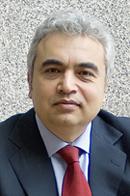IEA World Energy Outlook 2011: what about coal?
Speakers:
Dr. Fatih BIROL, Chief Economist, International Energy Agency, Paris
Dr. Hartmuth ZEISS, EURACOAL President and Chairman of the Managing Directors, Vattenfall Europe Mining AG and Vattenfall Europe Generation AG
The IEA World Energy Outlook (WEO) provides projections of energy demand, production, trade and investment, fuel by fuel and region by region. In 2011, it will includes a special focus on coal, the fastest growing source of primary energy over the last decade. Scenarios analysed in WEO anticipate future actions by governments to meet their commitments to tackle climate change and growing energy insecurity. These actions could have a marked impact on coal demand. Much depends on how emerging economies – led by China and India – choose to fuel their expanding economies. So far, coal has been the fuel of choice for electricity generation in many developing countries, but will this continue to be the case in the future? Much depends on technological developments and the relative costs of the available low-carbon options: nuclear, renewables and carbon capture and storage. Dr. Fatih Birol, Chief Economist at the International Energy Agency will present WEO and Dr. Hartmuth Zeiß will offer his view on why coal will remain a pillar of European energy supply for the foreseeable future. Both are likely to agree that CCS is vital for coal’s long-term future. The debate would then be on what short- and medium-term measures can best move us towards the low-carbon vision that many politicians are now committed to achieving. Bridging the gap between short-term political horizons and long-term investments in the energy-sector will not be easy.
International Energy Agency
The International Energy Agency (IEA) is an autonomous organisation which works to ensure reliable, affordable and clean energy for its 28 member countries and beyond. Founded in response to the 1973/4 oil crisis, the IEA’s initial role was to help countries co-ordinate a collective response to major disruptions in oil supply through the release of emergency oil stocks to the markets. While this continues to be a key aspect of its work, the IEA has evolved and expanded. It is at the heart of global dialogue on energy, providing authoritative and unbiased research, statistics, analysis and recommendations. Today, the IEA’s four main areas of focus are: energy security, economic development, environmental awareness and engagement worldwide.
European Association for Coal and Lignite
The European Association for Coal and Lignite is the umbrella organisation of the European coal industry. Associations and companies from twenty countries work together in EURACOAL to ensure that the interests of coal producers, importers, traders and consumers are properly served. Its 35 members come from 20 countries across the EU-27 and Energy Community. As the voice of coal in Brussels, EURACOAL evolved from CECSO (European Solid Fuels Association) after expiry of the European Coal and Steel Community treaty in 2002. EURACOAL’s mission is to highlight the importance of the European coal industry to energy supply security, energy price stability, economic added value and environmental protection. EURACOAL seeks to be an active communicator, with the aim of creating an appropriate framework within which the coal industry and coal consumers can operate.



